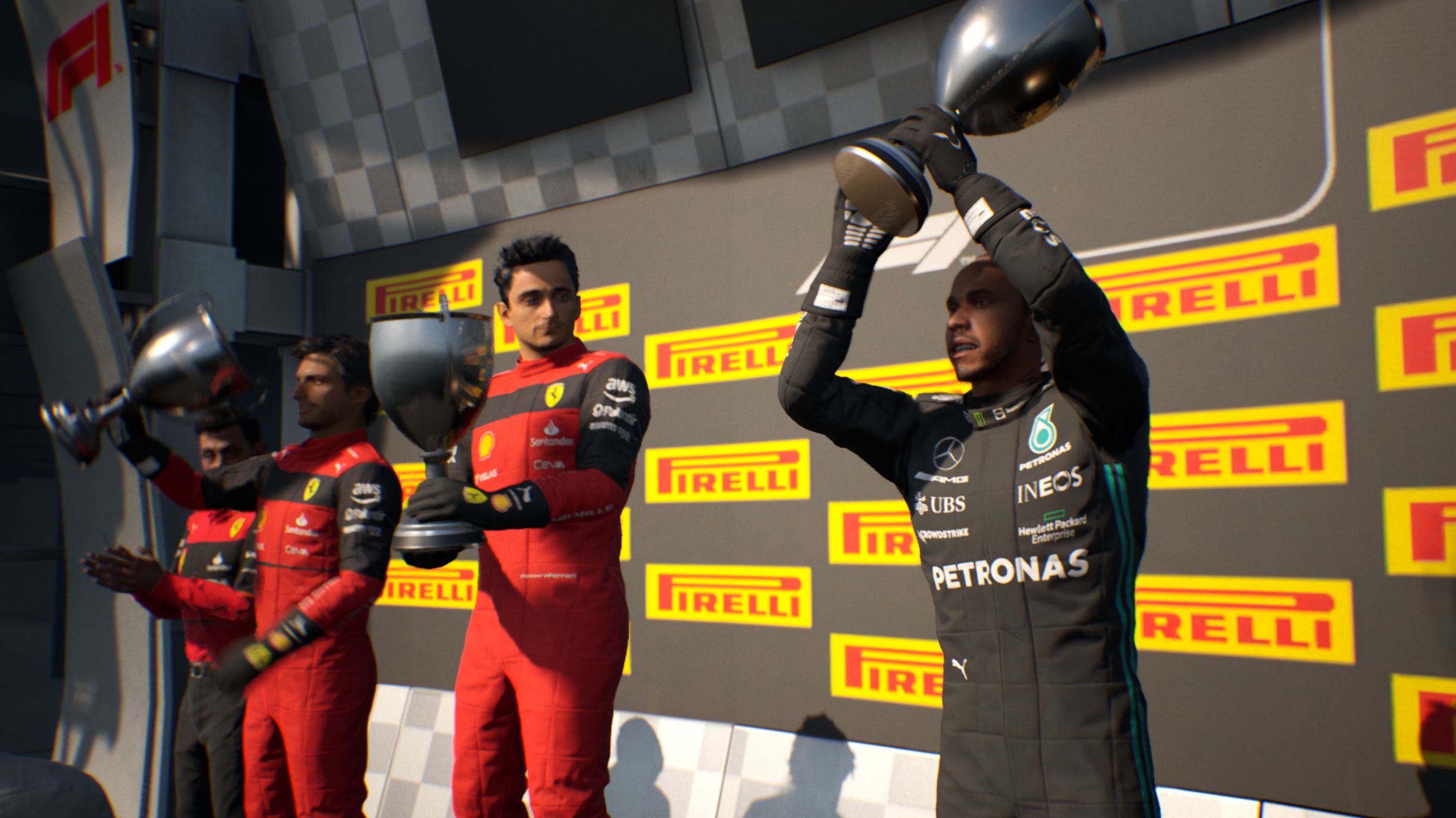Our Verdict
Tense and involving, if just slightly lacking smarts and spectacle. A firm foundation to build a series on.
PC Gamer's got your back
What is it? A licensed F1 management sim from the Elite devs.
Released August 30, 2022
Expect to pay $55/£45
Developer Frontier Developments
Publisher Frontier Developments
Reviewed on Core i7 9700K, RTX 2080 TI, 16GB RAM
Multiplayer? No
Link Official site
If last season in Formula One was all about the driving, this year it's about the management. Gone are the days of Lewis and Max fighting bitterly for every inch of tarmac, sending each other off into runoff areas and exchanging the least sincere handshakes in the pre-podium room this side of a Premier League dugout. Instead of a historic, headline-grabbing, on-track duel, 2022 has given us a season of baffling managerial incompetence. Bad news for anybody except Max Verstappen—and Frontier Developments.
Because when you watch the throttle pedal come loose on Leclerc's Ferrari while he's five laps from victory at Austria, or find yourself shouting at Mercedes' tire strategy in a safety car-laden Zandvoort, your natural inclination is to think you can do better. "Stay out, you fools!" You say to no one. "Let them blink first!"
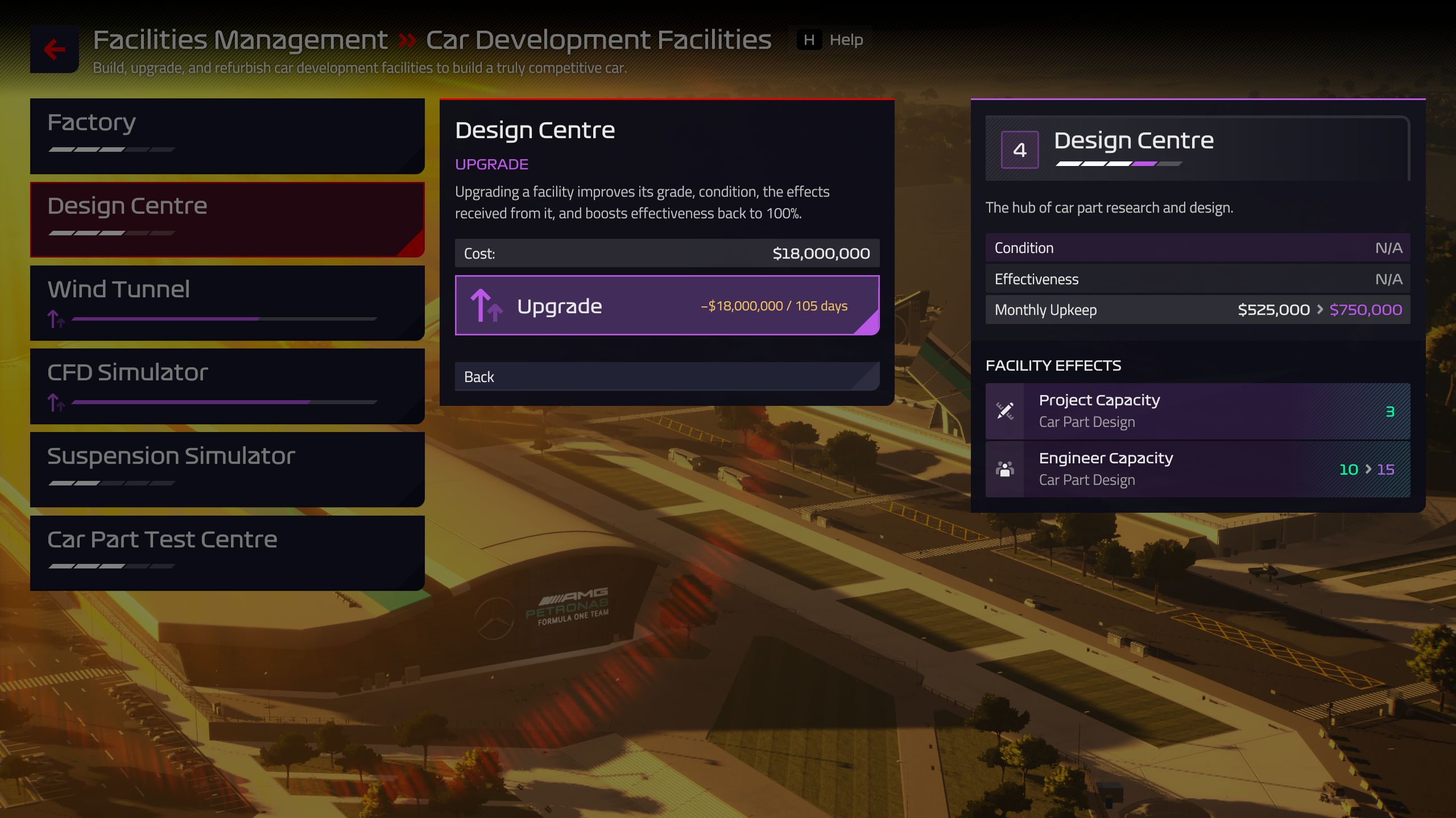
Well, now's the chance to find out exactly how our brand of managerial incompetence stacks up against the rest of the grid. In its debut licensed F1 management sim, Frontier Developments conveys both the palm-drenching reactivity of a Sunday in the sport, and the frantic development race happening in between.
As team boss, you're in charge of everything from signing the drivers who'll sit in your car to the design and manufacture of that car's component parts. Pit crews jump into action on race day at your say-so, and even the amount of money sponsors pay you depends on the promises you make to them before each race weekend. Bizarrely, you're even involved in each car's mechanical setup. You wanton megalomaniac.
That makes for a nice cadence. Slow, therapeutic progression through email inboxes and front wing design menus, and then bursts of race day adrenaline as you're wrenched into a 3D engine showing the action on track. Something like Football Manager's menus to match engine transitions, or Civ's ponderous peacetime turning to terrifying wartime strategising. Your grand schemes are wrought in the wind tunnel, in driver contract negotiations and balance sheets. But it's the tarmac where you see them come to fruition. And it's that tick-tock of progress that has you bargaining with yourself in the dead of night: just one more race. I have to see where this new underfloor puts me on the grid.
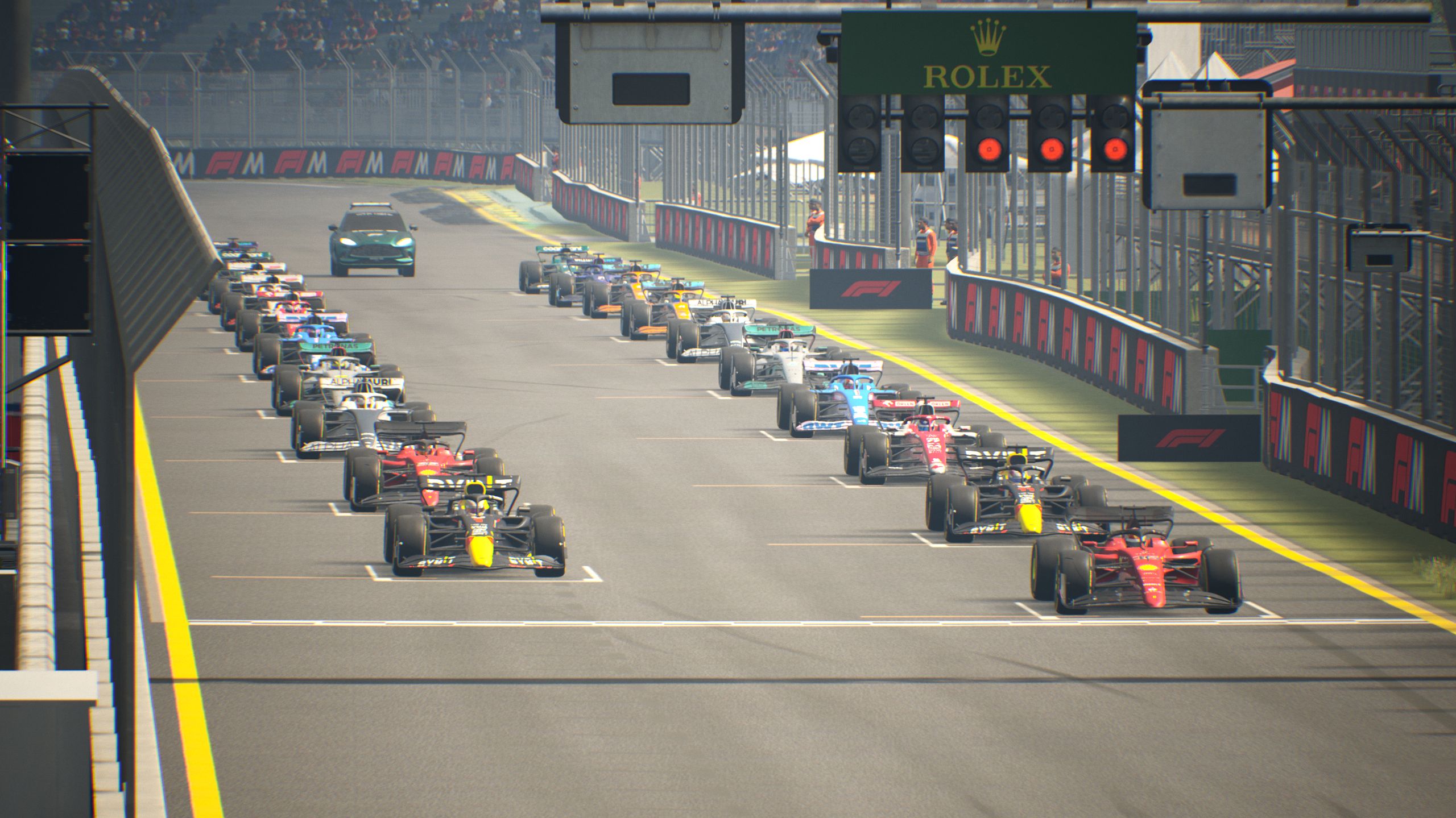
Mercedes are the beneficiary of a new, totally unproven and unqualified team boss in my playthrough. Toto Wolff? Pfff. He's only got seven constructors' titles and a successful investment banking career to his name. Out on his arse. Phil Iwaniuk's in charge of the mouse clicks now, and he's turning this sinking ship around.
I push through aero package updates across the whole car: chassis, front and rear wings, underfloor, sidepods and new suspension designs. At great expense, I rush the design and manufacture of all these components, sacrificing bank balance and XP gain in order to fit new parts on the car and bridge the performance gap to Red Bull and Ferrari as soon as possible. After all, at this point if Lewis Hamilton is sitting in an F1 car and unable to win, that's on the car.
Such an aggressive upgrade strategy is a luxury afforded only to the top three teams. Further into the midfield, budgets are just too tight to throw unnecessary money away on rushed upgrades. And when the parts do come in, they're more likely to offer less performance gain because they're devised and built in lower quality facilities. Compounding that misery, sponsor payouts are much smaller too because the cars are buzzing around off camera most of the time, fighting for P16. So if you're wondering why Williams and Haas don't just make a better car in real life, play a bit of F1 Manager 2022.
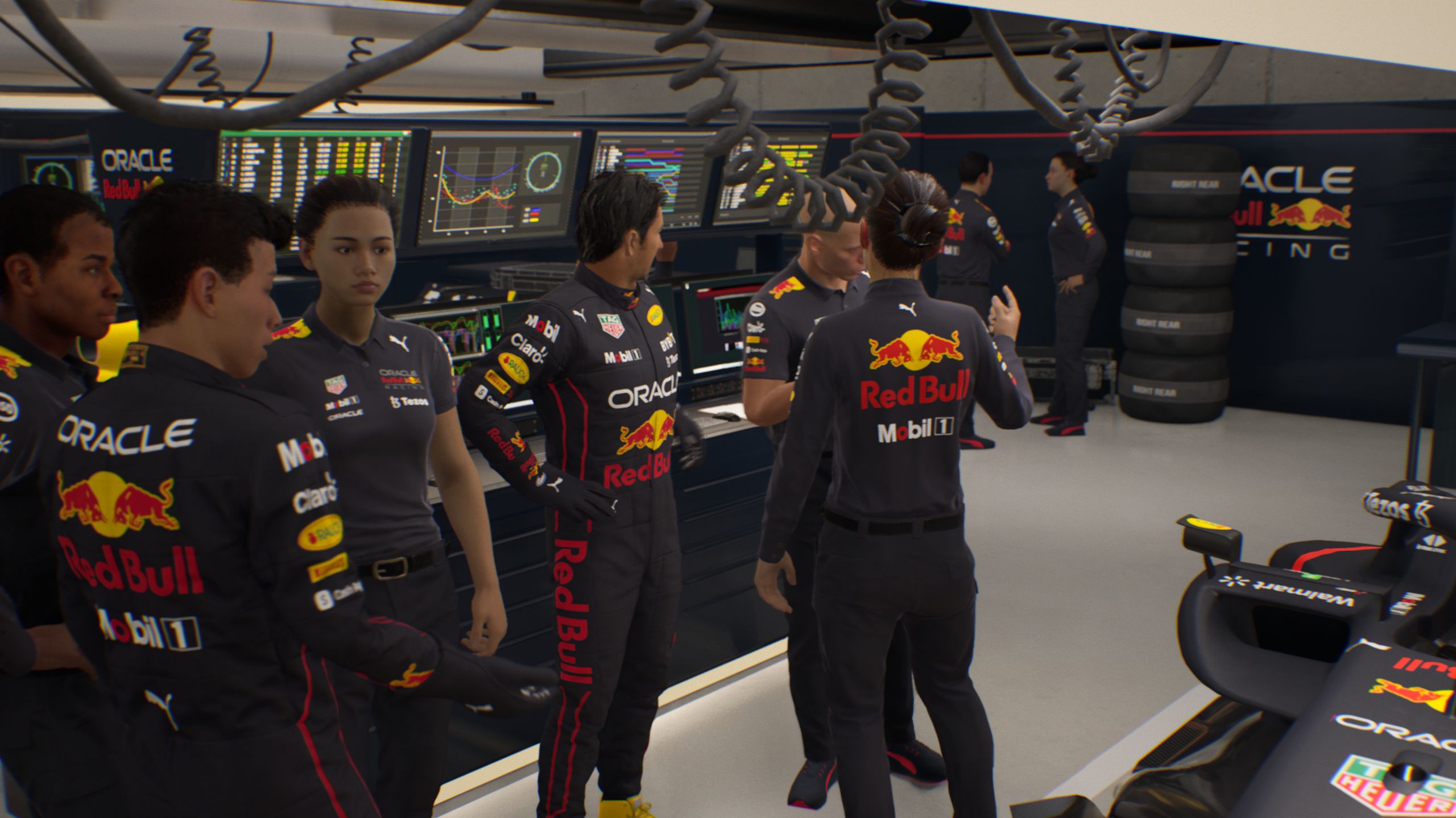
The satisfaction of righting a perceived wrong in the real sport—a favourite driver not able to win, rampant organisational incompetence costing a team a one-two finish weekend after weekend—is only there if the simulation feels convincing enough. And that's something F1 Manager does really well, through the combination of a well-pitched difficulty level and smart presentation elements like real team radio voice clips. The bubble would burst if the teams and drivers felt like lines of code, or if changing the order of the grid happened too easily. They don't, and it doesn't.
There's a lot of micromanagement to involve yourself in—drivers' pace, fuel burn level, ERS deployment and pit strategy all lay in your hands.
Despite all my hurried aero upgrades for the Silver Arrows, it's more than half a season before we can even think about winning a race or taking pole on sheer pace. In the meantime, our only hopes are weather and safety cars.
It's not a passive experience though, overseeing a race. There's a lot of micromanagement to involve yourself in—drivers' pace, fuel burn level, ERS deployment and pit strategy all lay in your hands. When you're managing all of these manually, corner to corner, it feels not unlike driving the car yourself. You're able to strong-arm your drivers through overtakes using these controls, but you can't brute-force a Williams onto the podium using judicious deployment of fuel and ERS alone. For the real head-turning results, you need a bit of luck from the aforementioned wet weather and crashes.
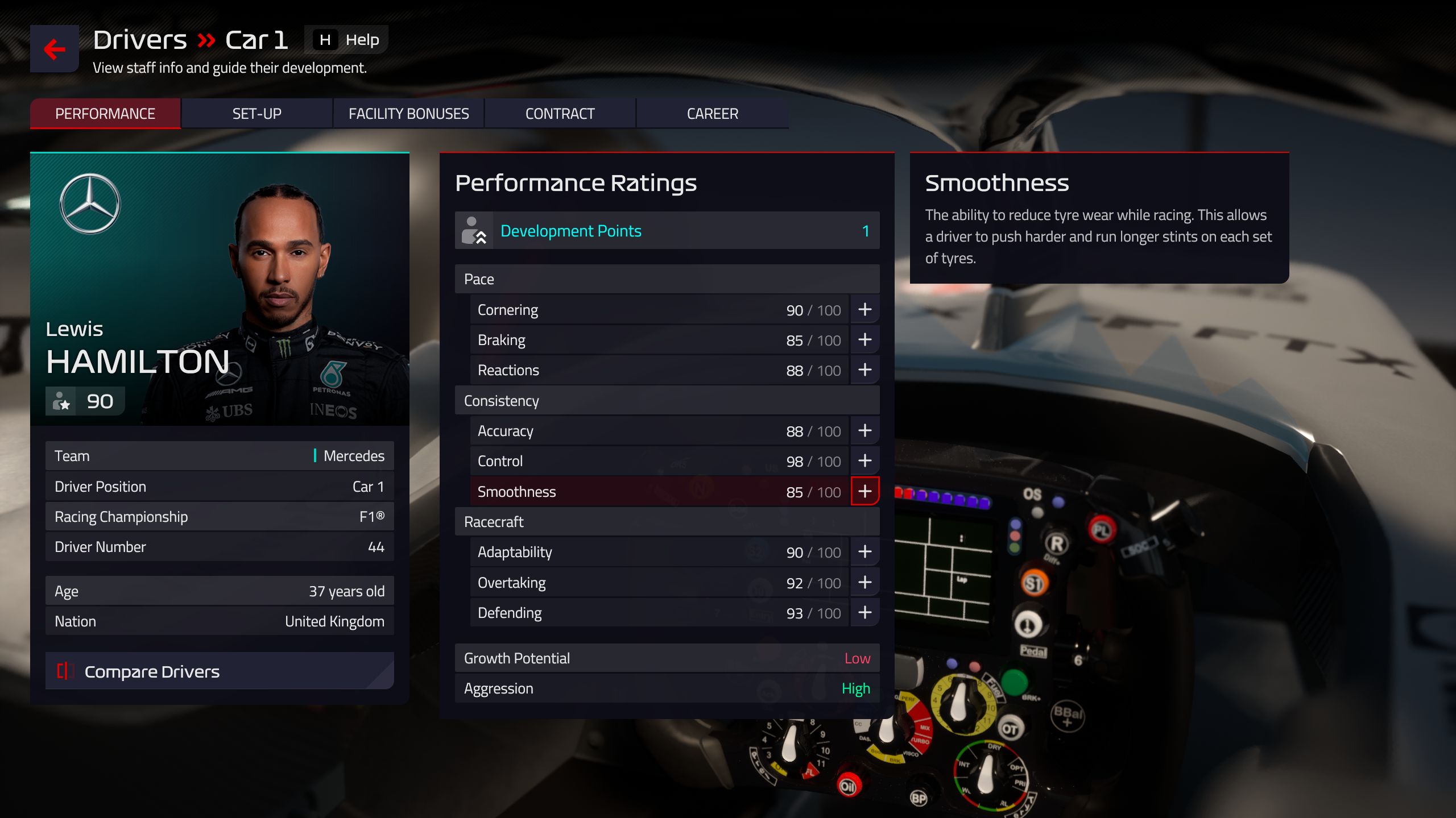
And it's here, in the more unpredictable dimensions of the sport, where F1 Manager 2022 reveals itself to be an inexperienced rookie rather than a wily old competitor. Crashes, safety cars and sudden downpours should be the most spectacular and pivotal moments of an F1 manager's season, chances for decisive strategy calls to prevail over outright performance.
Alas, crashes aren't really depicted in any detail—cars just stop on track, or run off into the gravel trap. The visual spectacle just isn't here yet. And while wet weather rolls in and soaks the track at a believable rate, the AI is usually a bit too hive minded to produce any interesting scenarios as a result. The same goes for safety car and VSC scenarios. Not yet in my time with the game has a driver elected to make an extra unscheduled pit stop in order to get onto fresh soft compounds, as we saw with Red Bull in Zandvoort lately—or, rather more famously, with Red Bull in Abu Dhabi last year.
You can make up a bit of ground in these scenarios, and there's definitely a sense of tension and adrenaline when they happen. But after a while it becomes clear that you're feeling pumped because of what you expect could happen, rather than what generally goes. There's very few instances of renegade or reactive pit stops, and that in turn doesn't force you into making many reactive decisions.
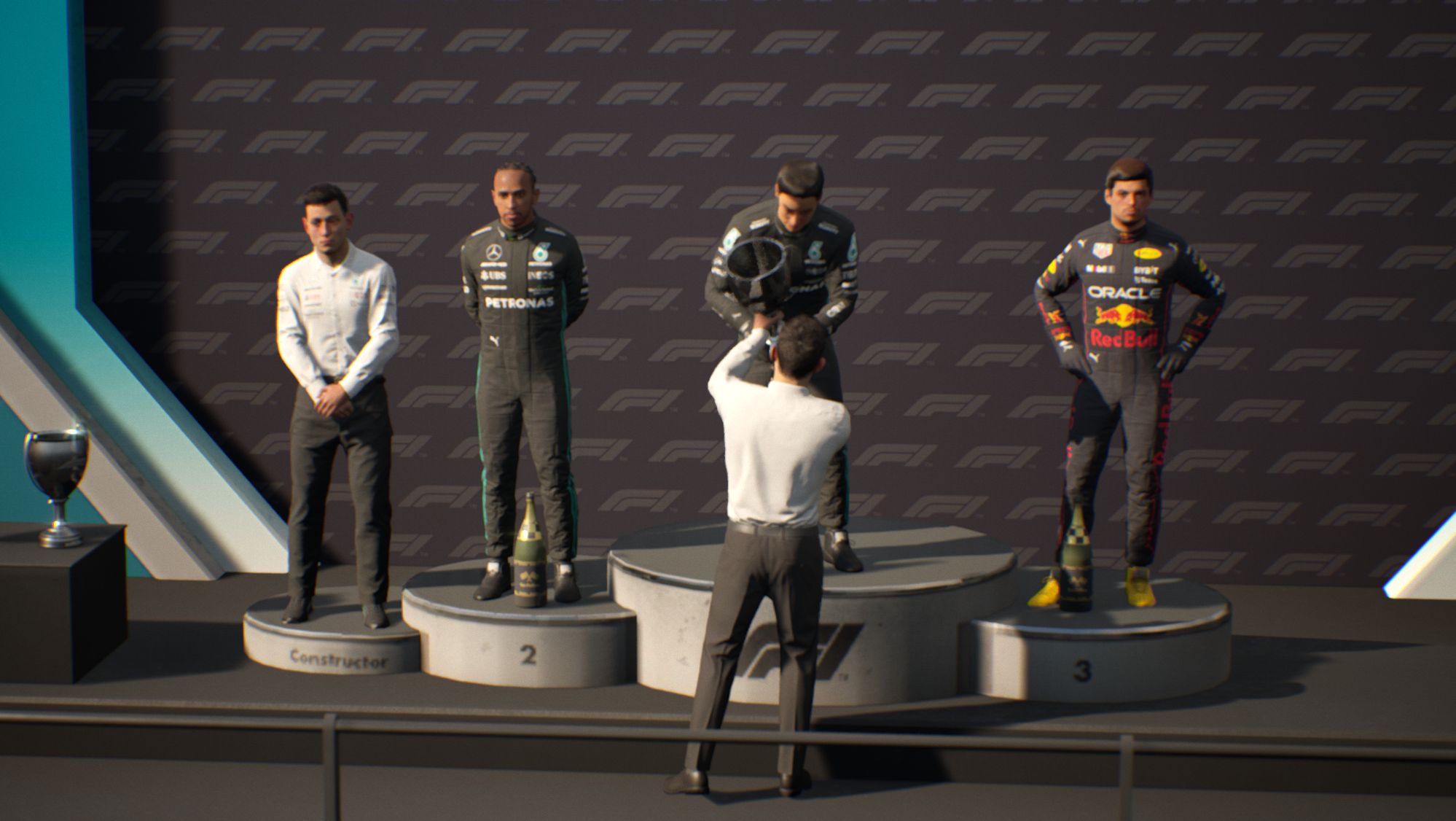
Where the AI really lets down this endeavour, though, is in the cockpit. It's hard to imagine that you're watching seven-time champion Lewis Hamilton when he's trailing Valtteri Bottas for 40 laps at Monaco, no matter what you tell him to do with the tires, fuel and ERS. And it's hard to forgive the time you lose passing a back-marker who doesn't seem willing or able to get out of your way. George Russell lost 10 seconds to Latifi once. There's no clever pit strategy to counteract that one.
It's hard to imagine that you're watching seven-time champion Lewis Hamilton when he's trailing Valtteri Bottas for 40 laps at Monaco.
In the next instalment, which will surely come, AI behaviour should be a point of focus for Frontier. Right now it's responsible for breaking the illusion just that bit too often. But even with a grid full of dunces, F1 Manager 2022 produces consistently thrilling races, and seems to deepen my investment in my Mercedes rebuild every hour I spend with it.
Lewis takes his maiden win of the season at Spa, quite late, and George Russell got the first top step of his career in a bizarrely rainy Miami race. But two seasons in and over $50m spent on upgrades, Red Bull still has the outright pace advantage. That's exactly how I'd want it, too. You don't want to score the science victory in Civ before you hit the classical era.
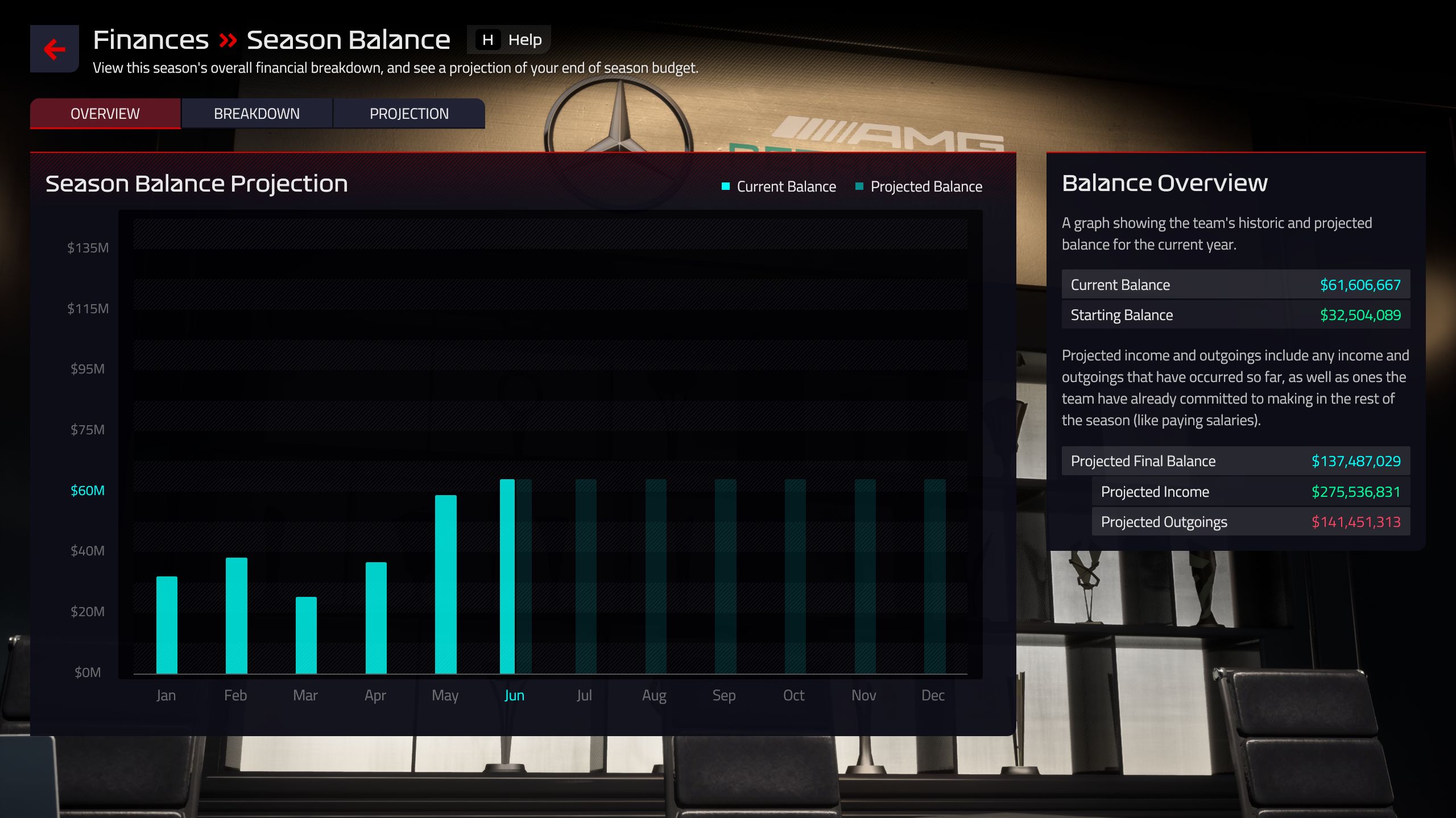
Frontier can be proud of its well-judged foundational release in what will certainly become a long-running series. In a perfect world, we'd see cars shatter into carbon fibre splinters when they crashed, and we'd recognise the Verstappens and Ricciardos by their driving styles, not just their liveries. As it is, the fundamentals are all in place, ready to build on.
A foundation, ironically, that's been around for a few years already. This game owes a tremendous debt of gratitude to Playsport Games' 2017 Motorsport Manager, which formed an extremely comprehensive blueprint for how modern racing management sims should play. A blueprint that Frontier has observed almost to the millimetre, right down to the way you refine car setups through free practice sessions. The licence and the high-detail race visuals do enough to discern this new game though, and F1 Manager 2022 wields its shiny official license in all the right areas, building a convincing ecosystem that evolves season to season, and keeps you chasing that perfect car for even longer than Toto has.
Tense and involving, if just slightly lacking smarts and spectacle. A firm foundation to build a series on.
Phil 'the face' Iwaniuk used to work in magazines. Now he wanders the earth, stopping passers-by to tell them about PC games he remembers from 1998 until their polite smiles turn cold. He also makes ads. Veteran hardware smasher and game botherer of PC Format, Official PlayStation Magazine, PCGamesN, Guardian, Eurogamer, IGN, VG247, and What Gramophone? He won an award once, but he doesn't like to go on about it.
You can get rid of 'the face' bit if you like.
No -Ed.
